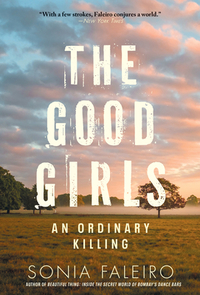Take a photo of a barcode or cover
just an absolutely horrific story with a despairing conclusion. I hope the tides turn for the women in India - I've seen so much on the news indicating that not much has changed in the ten years since these girls died
dark
emotional
informative
reflective
sad
tense
medium-paced
Phenomenal and heartbreaking reporting from Sonia Faleiro on the death of two children in India, and what it says about casteism, reputation, and politics in one of the world’s biggest and ostensibly forward thinking nations. I will be thinking about this book for years to come.
"And so, just like that, in less than an hour since they were gone, Parma was no longer the quick-tempered one. Lillian was no longer the faithful partner in crime. Who they were, and what had happened to them, was already less important that what their disappearance meant to the status of the people left behind." p53
“Chaturvedi knew that his boss could not care less about Padma and Lalli. The thing about India, he would say, was that there was a lot of people. And this was an ordinary killing, just two girls in some village.” p89
“They would wait for the politicians to arrive [before allowing the bodies to be taken down from the tree]. And with this, the Shakya family demonstrated their keen understanding of how India functions. The wheels of justice move only under pressure from the powerful.” p95
“Chaturvedi knew that his boss could not care less about Padma and Lalli. The thing about India, he would say, was that there was a lot of people. And this was an ordinary killing, just two girls in some village.” p89
“They would wait for the politicians to arrive [before allowing the bodies to be taken down from the tree]. And with this, the Shakya family demonstrated their keen understanding of how India functions. The wheels of justice move only under pressure from the powerful.” p95
Faleiro had heard about the Badaun killings on Twitter, in the year 2014, as did most of us. It shook her to this extent that she decided to go the village of Katra in the Badaun district in Uttar Pradesh where the death of two teenage girls, who were also cousins, took place. The picture that circulated on social media was that of them hanging from a mango tree, whose memory is etched in so many minds and hearts. Though momentarily forgotten perhaps, it can be conjured in an instant. Between 2014 and 2019, Faleiro interviewed everyone connected with the deaths to produce a story in which there are different perspectives – each struggling to make themselves heard, each hustling for credibility.
Whether it is a cousin who claimed to have seen the girls getting kidnapped by Pappu Yadav, a 19-year old from the neighbouring village. Or whether it was someone else who had claimed to have spotted Pappu with the girls (who are known as Padma and Lalli in the book). Or whether it was the parents and relatives of these girls who didn’t act soon enough, scared that their honour will be at stake. Well, at the end of the day, the truth is that the girls were dead.
The Good Girls: An Ordinary Killing by Sonia Faleiro is not just an investigative book or a “non-fiction novel” as some would seem it to be. It is a chronicle of what women go through in the country on a daily basis, and this isn’t just restricted to one region or is a function of being educated or not. The brutal rape and murder of Jyoti Singh in 2012 is a testament of that fact. The Good Girls is a book that holds no judgement. It is about the facts, and yet Faleiro’s writing is so strong and insightful that you cannot help but feel overwhelmed in most places while reading. The idea that two teenage girls – children really, died before their time. The idea that they could not lead full lives. The idea that we give so much importance to factors such as caste, honour, about how a girl should be and should not be, that we forget to consider life – the very basic essence of life and living.
Sonia Faleiro’s book is about the India that is still struggling with so much – patriarchy, lack of education for women and girls, poverty being the biggest issue (which most , maybe even all politicians turn a blind eye to or very conveniently use it to their advantage), about lack of faith not only in the judiciary system but also in the workings of the police and safety that cannot be trusted, and about the way we treat our women and men at the same time.
The Good Girls: An Ordinary Killing – just the very title says so much. Something that is so chilling, and yet only so ordinary that it could take place on an almost daily basis (and maybe does) and yet apathy is supreme. Sonia Faleiro also without taking any side goes to the heart of that apathy and indifference through this work that chronicles the brutality, that takes place more on a mental and emotional level. Faleiro’s writing is to the point. All facts and suppositions (that sprung from various narratives) are laid out for the reader. Everything is in plain sight. The Good Girls: An Ordinary Killing never lets us forget that at the heart of it – of all that occurred, two teenage girls, two children really, with so much life, and possibility and a future, lost their lives to patriarchy and its machinations.
Whether it is a cousin who claimed to have seen the girls getting kidnapped by Pappu Yadav, a 19-year old from the neighbouring village. Or whether it was someone else who had claimed to have spotted Pappu with the girls (who are known as Padma and Lalli in the book). Or whether it was the parents and relatives of these girls who didn’t act soon enough, scared that their honour will be at stake. Well, at the end of the day, the truth is that the girls were dead.
The Good Girls: An Ordinary Killing by Sonia Faleiro is not just an investigative book or a “non-fiction novel” as some would seem it to be. It is a chronicle of what women go through in the country on a daily basis, and this isn’t just restricted to one region or is a function of being educated or not. The brutal rape and murder of Jyoti Singh in 2012 is a testament of that fact. The Good Girls is a book that holds no judgement. It is about the facts, and yet Faleiro’s writing is so strong and insightful that you cannot help but feel overwhelmed in most places while reading. The idea that two teenage girls – children really, died before their time. The idea that they could not lead full lives. The idea that we give so much importance to factors such as caste, honour, about how a girl should be and should not be, that we forget to consider life – the very basic essence of life and living.
Sonia Faleiro’s book is about the India that is still struggling with so much – patriarchy, lack of education for women and girls, poverty being the biggest issue (which most , maybe even all politicians turn a blind eye to or very conveniently use it to their advantage), about lack of faith not only in the judiciary system but also in the workings of the police and safety that cannot be trusted, and about the way we treat our women and men at the same time.
The Good Girls: An Ordinary Killing – just the very title says so much. Something that is so chilling, and yet only so ordinary that it could take place on an almost daily basis (and maybe does) and yet apathy is supreme. Sonia Faleiro also without taking any side goes to the heart of that apathy and indifference through this work that chronicles the brutality, that takes place more on a mental and emotional level. Faleiro’s writing is to the point. All facts and suppositions (that sprung from various narratives) are laid out for the reader. Everything is in plain sight. The Good Girls: An Ordinary Killing never lets us forget that at the heart of it – of all that occurred, two teenage girls, two children really, with so much life, and possibility and a future, lost their lives to patriarchy and its machinations.
After the bodies of two girls were found hanging from a mango tree in rural India, their family insisted they remain there until political attention had been brought to their deaths. I appreciate how exhaustive this is; I didn't know much about the politics of rural India going in, and context is everything in understanding why these girls died and how the investigation into their deaths was conducted. An insightful, wide-reaching, heartbreaking, and productive book.
challenging
dark
emotional
informative
medium-paced
challenging
dark
emotional
informative
mysterious
reflective
sad
tense
medium-paced
Graphic: Child death, Misogyny, Racism, Sexism, Sexual violence, Suicide, Violence, Police brutality, Grief, Injury/Injury detail, Classism
The true story of 2 teenage girls killed in India. The author presents the facts and let's you make your own conclusions.
dark
informative
sad
medium-paced
This is a story about the marginalisation and subjugation of women against the backdrop of poverty in modern India.
It's a harrowing case, diligently and sensitively investigated by Sonia Faleiro. She takes great pains to weave together a story that reflects the culture, societal norms and belief systems operating at the time that led to these two young girls losing their lives.
It's a harrowing case, diligently and sensitively investigated by Sonia Faleiro. She takes great pains to weave together a story that reflects the culture, societal norms and belief systems operating at the time that led to these two young girls losing their lives.




